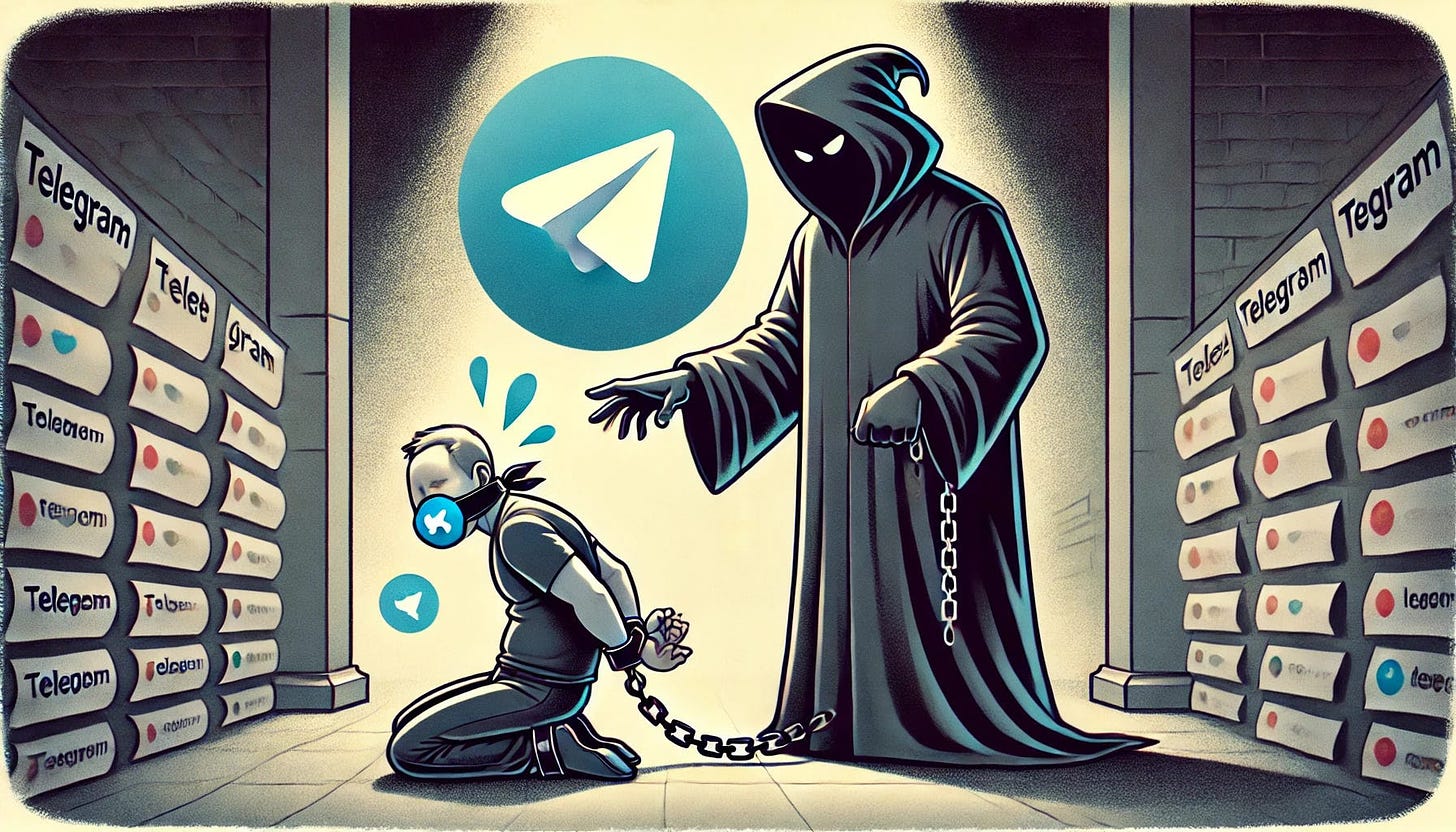RT: How the EU tightened the noose on Telegram
Before Pavel Durov’s arrest, the messaging app’s “Russian origins” placed it in the bloc’s crosshairs
Comment: There is a concerted effort to curtail free speech around the world now. My own Substack has been blocked continuously in Malaysia for almost one year now. What happened to Julian Assange is now happening to many journalists and media owners who are not complying with government censorship demands. Its not safe for Elon Musk to travel to Europe now.
The arrest in France of Telegram founder Pavel Durov is the latest escalation in an EU-wide campaign against the Russian entrepreneur and his privacy-focused messaging app. After limited bans in some member states, officials in Brussels announced earlier this year that they would bend their own laws to enforce censorship rules on the platform.
Durov, who also holds French citzenship, was arrested at Paris-Le Bourget Airport on Saturday, immediately after arriving from Azerbaijan by private jet. According to French media, prosecutors in Paris plan to accuse the 39-year-old of complicity in drug trafficking, pedophilia offenses, and fraud. They will reportedly argue that Telegram’s insufficient content moderation, its strong encryption tools, and its alleged lack of cooperation with police allow criminality to flourish on the app.
In the years leading up to Durov’s arrest, EU officials and individual member states have targeted Telegram with bans, regulations, and threats of legal action.
2021: Germany calls for actionAfter a group of radical anti-vaxxers were arrested for allegedly plotting on Telegram to kill the governor of the state of Saxony in 2021, German Justice Minister Marco Buschmann called for an EU-wide effort to restrict the platform.
Throughout the coronavirus pandemic, governors and regional interior ministers in Germany had expressed displeasure with Telegram’s refusal to ban anti-lockdown protesters, and Buschmann argued that common EU action would “make a bigger impression” on Telegram than “each country trying to do that on its own.”
Telegram was and still is headquartered in Dubai, and Durov reportedly refused to communicate with the German authorities. German Interior Minister Nancy Faeser warned at the time that Berlin was “not going to put up with” Durov’s refusal to cooperate.
2022-2024: Bans and restrictionsThe Ukraine conflict gave national and local governments across the West an excuse to throttle Telegram, with the Norwegian Justice Ministry citing the platform’s “Russian origins” when it forbade government employees from installing the app on their work devices last year.
Amsterdam’s municipal government also invoked the alleged threat of “foreign espionage” when it issued a similar ban for employees of the Dutch city last week, while France last year ordered civil servants to switch from Telegram and other messaging apps to locally-developed alternatives over security fears.
In March of this year, Spain’s high court ordered the country’s mobile providers to block access to Telegram, while claims of copyright violations could be investigated. Although the ruling was overturned within days, the investigation is ongoing.
2024: Censorship crackdownThe EU’s Digital Services Act (DSA), which came into force earlier this year, requires so-called ‘Very Large Online Platforms’ (those with more than 45 million monthly users) to comply with a host of data protection and advertising-related rules. Such platforms are also required to “address the spread of disinformation,” a term that the DSA mentions more than a dozen times without providing a definition.
While Telegram claims to have 41 million monthly users in the EU, European Commission Vice President for Values and Transparency Vera Jourova told Bloomberg in May that the platform is a “special case,” and would be investigated and potentially placed on the list anyway.
Jourova accused Telegram of enabling the spread of Russian “disinformation,” and called it “an issue” that the platform is “especially active in the eastern member states where we have a Russian-speaking minority.”
Ahead of this potential regulation, Telegram has appointed a Brussels-based company as its legal representative in the EU, meaning that Belgian authorities will be responsible for enforcing EU law against Durov’s company. Last week, the Belgian Institute of Post and Telecommunications (BIPT) announced that it still could not prove that Telegram had more than 41 million monthly users.
The DSA allows the EU to fine platforms as much as 6% of their global annual turnover if they break its rules. The law also allows repeat offenders to be banned from operating in the bloc.
Originally published in RT 16th August 2024
Subscribe Below:



No comments:
Post a Comment